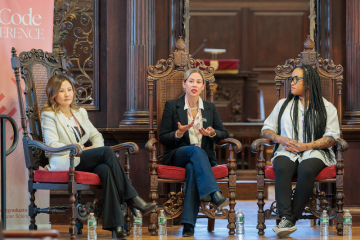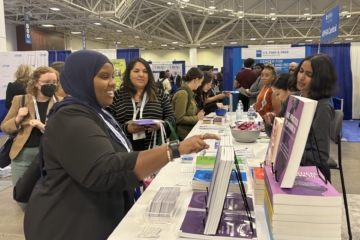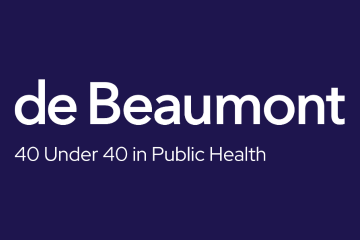Read Megan’s bio. See all 40 Under 40 honorees.
Five Questions for Megan
1. What inspired you to enter the field of public health?
I started college as a communications major with hopes of doing public relations in the music industry. Sophomore year, I volunteered at Champaign County Health Care Consumers – a grassroots, community-organizing nonprofit in central Illinois fighting for healthcare access and environmental justice. I staffed the Consumer Health Hotline, providing case management to residents experiencing problems with accessing healthcare. It was such a transformative experience. Fighting alongside individuals negatively impacted by a broken healthcare system – combined with an understanding of the policies and practices that perpetuated system failures – solidified my passion for social justice and commitment to working in the service of others.
2. What is one of the most interesting projects you’ve worked on in public health?
The COVID response efforts bring daily heartbreak, lessons, and appreciation. I am leading the department’s response efforts for people experiencing homelessness in collaboration with county and city partners. This pandemic serves as our society’s mirror, and we are responding to a public health emergency on top of an existing crisis. There had been some progress over the last few years to address homelessness, but we still have a long way to go. We are working to protect a population that has higher rates of morbidity and mortality, lack healthcare linkages, and often live in conditions that don’t allow for practicing proper physical distancing or sanitation. I continue to be amazed by my colleagues’ tireless commitment to their clients. I am heartened by the efforts to establish thousands of housing units in weeks that I hope will continue to be a haven for those who are unsheltered beyond COVID.
I learn every day about how this pandemic unveils our societal weaknesses. For me, I hope that comes with the recognition that our systems need changing so that they can be responsive to our under-resourced communities and vulnerable populations. As we engage new policies that may seem politically divisive, I am optimistic that we will one day see that the investments that serve the whole are better than those that serve just a few.
3. What are the greatest challenges you face in your work?
I see my greatest challenge as our greatest opportunity – to create a more just health system. One that is ready and able to meet the needs of all of LA County’s residents.
4. What’s an experience that keeps you going, even when you’re feeling challenged?
My parents are a constant source of inspiration. They both worked so hard for everything we had and pushed us not to take the privilege of our daily life for granted – having a place to call home, going to sleep each night with a full stomach, and living in a resourced community where I felt supported. My father couldn’t say that growing up, and he and my mother worked extremely hard so that we didn’t have those worries. They also instilled in me the values of justice and public service, and when there is unfairness, I can play a role in changing the systems that create those inequities. When the work gets challenging, I think of him and the millions of people who came into this world with the odds unfairly stacked against them.
5. As a kid, what did you want to be when you grew up?
It varied by the day, but a teacher, veterinarian, librarian, and grocery store clerk were in the mix. The latter was my high school and college job.





